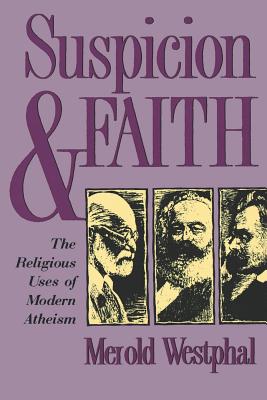Suspicion and Faith: The Religious Uses of Modern Atheism

Suspicion and Faith: The Religious Uses of Modern Atheism
Marx, Nietzche, and Freud are among the most influential of modern atheists. The distinctive feature of their challenge to theistic and specifically Christian belief is expressed by Paul Ricoeur when he calls them the masters of suspicion.While skepticism directs its critique to the truth or evidential basis of belief, suspicion asks two different, intimately intertwined questions: what are the motives that lead to this belief? and what function does it play, what work does it do for the individuals and communities that adopt it. What suspicion suspects is that the survival value of religious beliefs depends on satisfying desires and interests that the believing soul and the believing community are not eager to acknowledge because they violate the values they profess, as when, for example, talk about justice is a mask for deep-seated resentment and the desire for revenge. For this reason, the hermeneutics of suspicion is a theory, or group of theories, of self-deception: ideology critique in Marx, genealogy in Nietzsche, and psychoanalysis in Freud.Suspicion and Faith argues that the appropriate religious response (the religious uses of modern atheism) to these critiques is not to try to refute or deflect them, but rather to acknowledge their force in a process of self-examination--and this for two reasons. First, while these critiques are not, as Marx, Nietzsche, and Freud tend to suppose.
PRP: 382.85 Lei
Acesta este Prețul Recomandat de Producător. Prețul de vânzare al produsului este afișat mai jos.
344.56Lei
344.56Lei
382.85 LeiIndisponibil
Descrierea produsului
Marx, Nietzche, and Freud are among the most influential of modern atheists. The distinctive feature of their challenge to theistic and specifically Christian belief is expressed by Paul Ricoeur when he calls them the masters of suspicion.While skepticism directs its critique to the truth or evidential basis of belief, suspicion asks two different, intimately intertwined questions: what are the motives that lead to this belief? and what function does it play, what work does it do for the individuals and communities that adopt it. What suspicion suspects is that the survival value of religious beliefs depends on satisfying desires and interests that the believing soul and the believing community are not eager to acknowledge because they violate the values they profess, as when, for example, talk about justice is a mask for deep-seated resentment and the desire for revenge. For this reason, the hermeneutics of suspicion is a theory, or group of theories, of self-deception: ideology critique in Marx, genealogy in Nietzsche, and psychoanalysis in Freud.Suspicion and Faith argues that the appropriate religious response (the religious uses of modern atheism) to these critiques is not to try to refute or deflect them, but rather to acknowledge their force in a process of self-examination--and this for two reasons. First, while these critiques are not, as Marx, Nietzsche, and Freud tend to suppose.
Detaliile produsului











